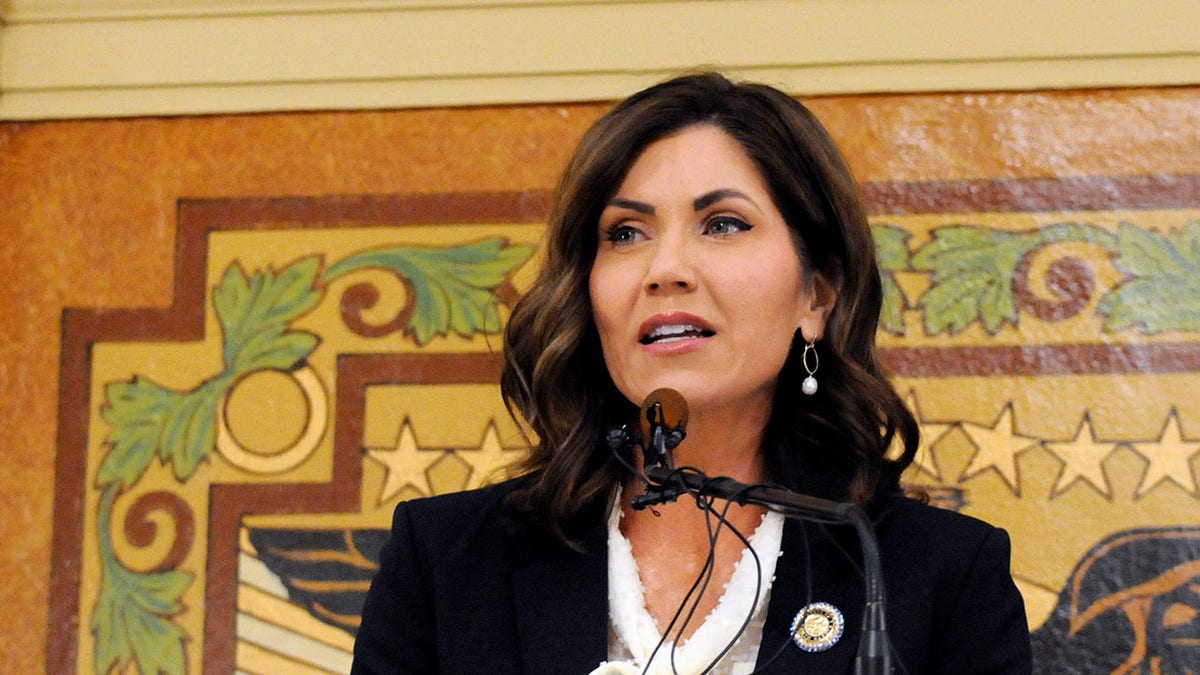South Dakota on right to track to getting back to normal, governor says
Gov. Kristi Noem lays out her roadmap to handling COVID-19 in her state on 'Fox & Friends.'
Get all the latest news on coronavirus and more delivered daily to your inbox. Sign up here.
Cheyenne River Sioux Tribe in South Dakota has refused to remove coronavirus checkpoints on U.S. and state highways running through its reservation despite Gov. Kristi Noem’s demands to do so.
Noem, a Republican, sent letters to the tribe's chairman, Harold Frazier, and to the president of the Oglala Sioux Tribe, Julian Bear Runner, giving them 48 hours to take down what she called illegal checkpoints before she’d take “necessary legal action” in federal court.
Chairman Frazier said Sunday that the checkpoints set up by the tribe in April are meant to monitor and track the potential spread of COVID-19 onto tribal lands.
CLICK HERE FOR FULL CORONAVIRUS COVERAGE

FILE - In this Jan. 8, 2019 file photo, South Dakota Gov. Kristi Noem gives her first State of the State address in Pierre, S.D. While many other governor’s have broken from President Donald Trump on stay-at-home orders to curb the spread of coronavirus or when to restart economic activity, Noem has tracked close to the president. (AP Photo/James Nord, File)
"We want to ensure that people coming from 'hot spots' or highly infected areas, we ask them to go around our land," Frazier told CNN.
“With the lack of resources we have medically, this is our best tool we have right now” against the spread of the coronavirus, he said, adding that “the nearest health care, critical care is three hours away from where we live."
Some 12,000 people live on the Cheyenne River Reservation covering about 4,267 square miles in Dewey and Ziebach counties. The Cheyenne River Sioux Tribe runs an eight-bed medical facility – with no intensive care unit – to serve their population.
U.S. Highway 212 and S.D. Highways 65, 63, and 20 pass through the reservation. South Dakota, along with only a handful of states, never issued a stay-at-home order. Though, both tribes have issued stay-at-home orders for their residents.
“We are strongest when we work together; this includes our battle against COVID-19,” Noem said in a statement included in her letter to the tribes Friday. “I request that the tribes immediately cease interfering with or regulating traffic on US and State Highways and remove all travel checkpoints.”
SOUTH DAKOTA GOV. NOEM CLASHES WITH SIOUX TRIBES OVER CORONAVIRUS CHECKPOINTS

Cheyenne River Sioux Tribe Chairman Harold Frazier in a February 2017 file photo. (Tasos Katopodis/Getty Images)
She cited an April memo from the U.S. Department of the Interior’s Bureau of Indian Affairs that said tribes must enter into an agreement with the state government before restricting travel on U.S. highways. The governor said that “neither consultation nor agreement among the tribal and state government occurred.”
A group of 17 state lawmakers sent the governor a letter Saturday saying they did "not wish to be part of another lawsuit that will ultimately cost the people of South Dakota more money." They said they want a "reasonable, legal and appropriate solution."
“I absolutely agree that we need to work together during this time of crisis, however, you continuing to interfere in our efforts to do what science and facts dictate seriously undermine our ability to protect everyone on the reservation,” Frazier said in a statement Saturday. “Ignorant statements and fiery rhetoric encourage individuals already under stress from this situation to carry out irrational actions.”
"We invite you to join us in protecting the lives of our people and those that live on this reservation. I regretfully decline your request," he said, adding that the tribe’s checkpoints were meant to "save lives rather than save face."
A summary of the Cheyenne River Sioux Tribe’s COVID-19 checkpoint policies posted on Facebook on April 20 said both residents and non-residents are required to fill out health questionnaires. Non-residents traveling from areas deemed hotspots in the state can only enter the reservation for essential business if they’ve been granted a permit from the tribe.
Residents can travel to non-hot spot areas in that state for essential work, medical appointments, or to buy goods not available on the reservation. If they must travel to a hot spot for these essential trips, they’re required to self-quarantine for 14 days when they return to the reservation.
CLICK HERE TO GET THE FOX NEWS APP
Bear Runner said in a Facebook video Saturday that Noem had “threatened the sovereign interest of the Oglala people when she issued an ultimatum” and “we have a prior and superior right to make our own laws and be governed by them,” according to Time.
The Oglala Sioux Tribe also set up checkpoints on highways through the Pine Ridge Indian Reservation in April that prevented all non-residents from entering tribal lands unless for essential business. Traffic was allowed to pass through the reservation if they agreed not to stop their vehicles, Time reported.










































